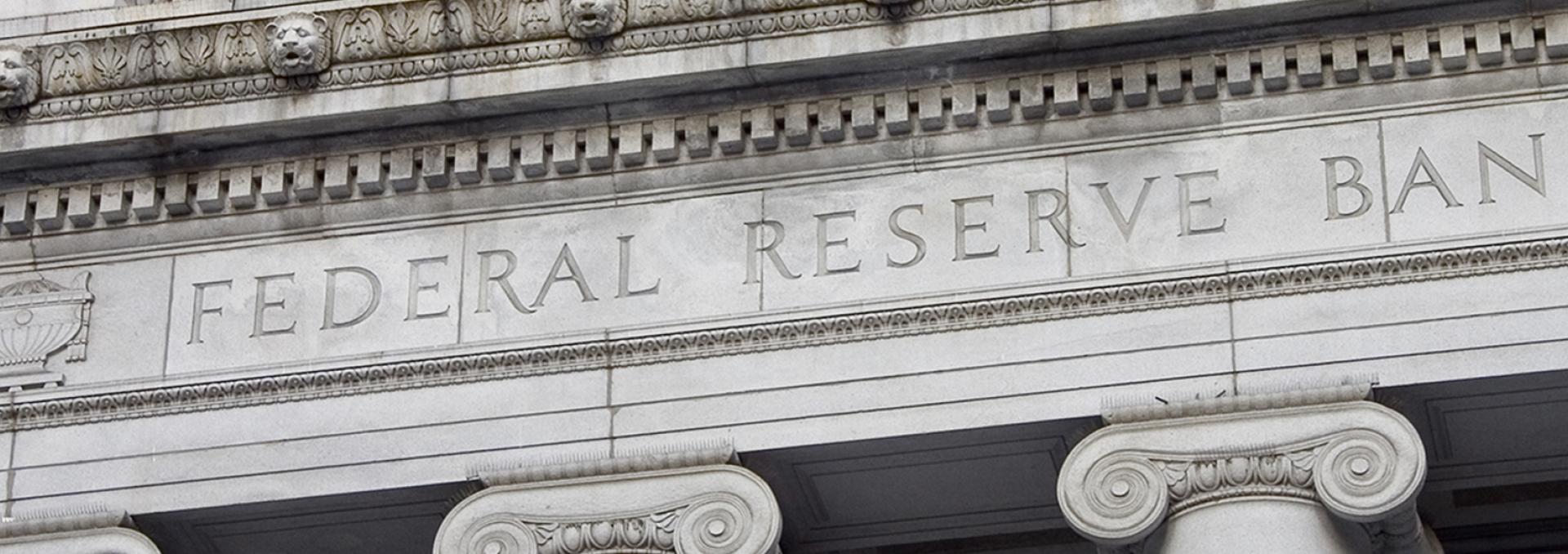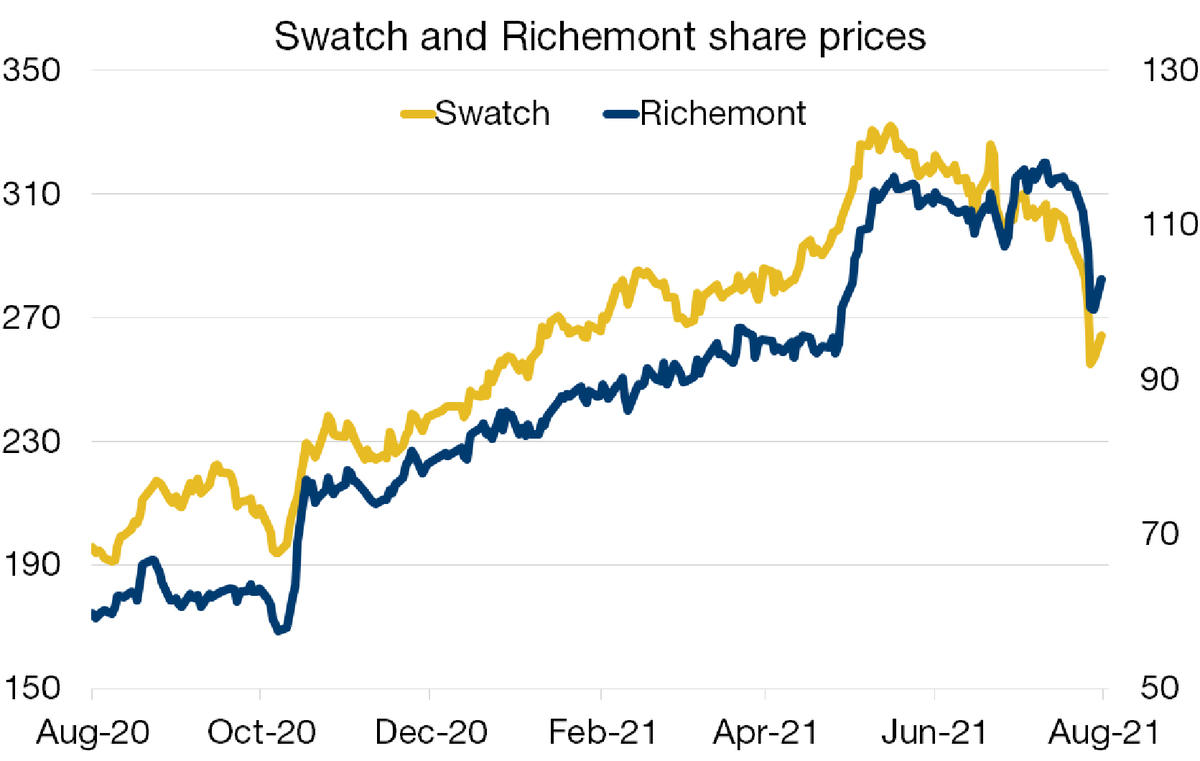
Are you interested in economic and financial news?
Bank Bonhôte is pleased to welcome you and puts at your disposal its finance experts.


| USD/CHF | EUR/CHF | SMI | EURO STOXX 50 | DAX 30 | CAC 40 | FTSE 100 | S&P 500 | NASDAQ | NIKKEI | MSCI Emerging Markets | |
| Latest | 0.92 | 1.07 | 12'415.66 | 4'147.50 | 15'808.04 | 6'626.11 | 7'087.90 | 4'441.67 | 14'714.66 | 27'013.25 | 1'220.78 |
| Trend | |||||||||||
| YTD | 3.59% | -0.78% | 16.00% | 16.74% | 15.23% | 19.36% | 9.71% | 18.25% | 14.17% | -1.57% | -5.46% |
(values from the Friday preceding publication)
Last week was a turbulent time in the markets, which reacted to Fed minutes and the Chinese government’s pronouncements.
The Fed has started to prep investors for a possible curtailment of monthly asset purchases, which are currently chugging along at USD 120 billion per month. And the tapering could even start this year. The Fed is on track to meet all three of its objectives, namely the resumption of growth, the 2% inflation target and the improvement in hiring. Inflation is even above-target, while the labour market is rapidly returning to normal. What is more, investors have become accustomed to this invisible hand supporting bond and equity markets for almost 10 years, in the form of the famous ‘Fed Put’.
The prospective of abandoning asset purchasing is likely to generate further volatility in financial markets, which is definitely not to investors’ liking. As comfortable as the current situation is, it is worth bearing in mind that a central bank buying up government debt is an ‘aberration’ – an unorthodox procedure that ought not to persist once the exceptional economic conditions justifying it in the first place have abated. While the withdrawal of stimulus will not be a smooth process, it is nevertheless a positive sign that the ‘patient’ (i.e. the US economy) no longer needs to be on life support.
Meanwhile China has continued its pronouncements, which seem to have replaced – in terms of market impact – the disruptive ‘Tweets’ posted by Donald Trump while he was still president. This week, China’s Communist Party mooted the idea of more strictly regulating what it sees as excessive corporate profits by encouraging beneficiaries to ‘give back’ more to society, marking a step towards a fairer distribution of wealth.
It is often stated in the literature that widening inequality can destabilise societies in the long run. Several Western economists have been sounding the alarm for years that income inequality in the West has reached levels not seen since the 1920s. In essence, the Chinese government’s concerns seem legitimate if we bear in mind that a core objectives is to improve the living conditions of its population as a whole. However, it is not yet clear how these new policy ideas will be implemented in the real economy.
Nothing more was needed to send luxury goods stocks, many of which have significant sales exposure to China, spiralling down sharply. There will doubtless be plenty more news about this theme in the weeks to come.
The Chinese government’s statement on wealth redistribution last Thursday knocked luxury goods stocks off kilter. As the affluent are directly affected by the news, investors dumped stocks such as Richemont, Hermès and LVMH. On the Swiss market, Swatch shed 11.9% and Richemont 13.8% in the space of the week. Asia accounts for between 35-55% of the sector’s revenues, with China the largest contributor. The Chinese consumer is therefore essential for the growth trend of these various groups. Richemont, Switzerland’s leading luxury goods company, generated 33% of its sales in China in the 2020-21 financial year.
This whole story is reminiscent of the anti-corruption drive launched by Xi Jinping in 2012, which triggered a sharp slowdown in the watch market simply because the Chinese no longer dared to leave the house with a luxury timepiece on their wrists. It was not until 2016 that watch exports to mainland China resumed sustainably. The Richemont share price fell by 44% between 2013 and 2016.
The Chinese government has a clear goal and aims to put pressure on the mega-rich as it seeks to achieve a more equitable distribution of wealth while remaining business and growth friendly. Luxury goods has long been a fast-growing sector, which explains the fierceness of the recent correction. Additionally, fears about Covid-19 and rising interest rates could put prices under further pressure. The effects of these policy shifts are usually short-lived. But systemic changes in China can have longer-term consequences, as we saw in 2012. Before this downbeat news, European luxury goods had been trading at a 90% premium to the MSCI Europe versus around 50% historically. Corrections such as this one make luxury stocks attractive again from a long-term perspective: Richemont is down 16% from its current-year peak and Swatch 23%.

Download the Flash boursier (pdf)
This document is provided for your information only. It has been compiledfrom information collected from sources believed to be reliable and up to date, with no warranty as to its accuracy or completeness.By their very nature, markets and financial products are subject to the risk of substantial losses which may be incompatible with your risk tolerance.Any past performance that may be reflected in this documentis not a reliable indicator of future results.Nothing contained in this document should be construed as professional or investment advice. This document is not an offer to you to sell or a solicitation of an offer to buy any securities or any other financial product of any nature, and the Bank assumes no liability whatsoever in respect of this document.The Bank reserves the right, where necessary, to depart from the opinions expressed in this document, particularly in connection with the management of its clients’ mandates and the management of certain collective investments.The Bank is a Swiss bank subject to regulation and supervision by the Swiss Financial Market Supervisory Authority (FINMA).It is not authorised or supervised by any foreign regulator.Consequently, the publication of this document outside Switzerland, and the sale of certain products to investors resident or domiciled outside Switzerland may be subject to restrictions or prohibitions under foreign law.It is your responsibility to seek information regarding your status in this respect and to comply with all applicable laws and regulations.We strongly advise you to seek independentlegal and financial advice from qualified professional advisers before taking any decision based on the contents of this publication.